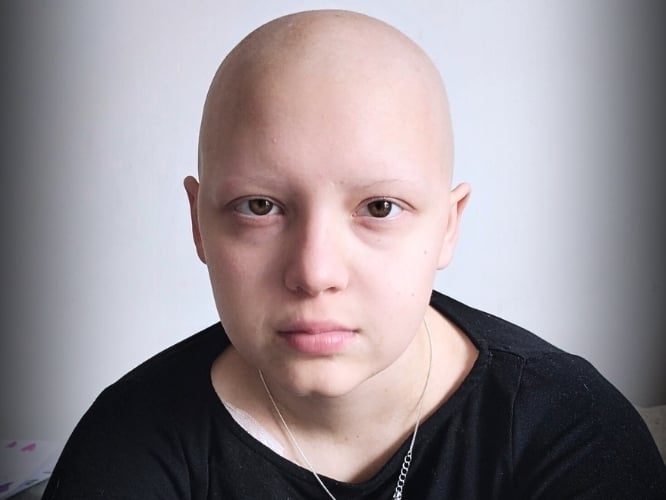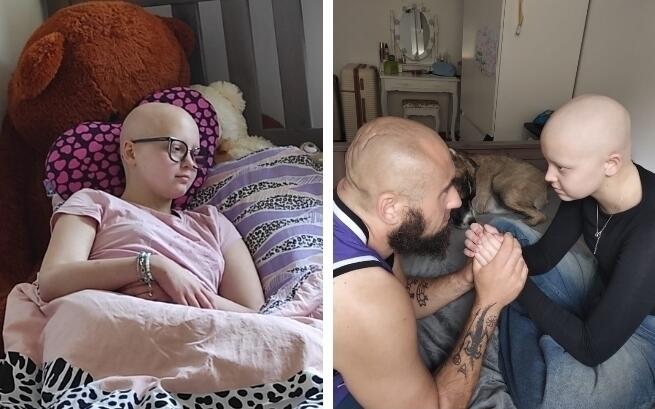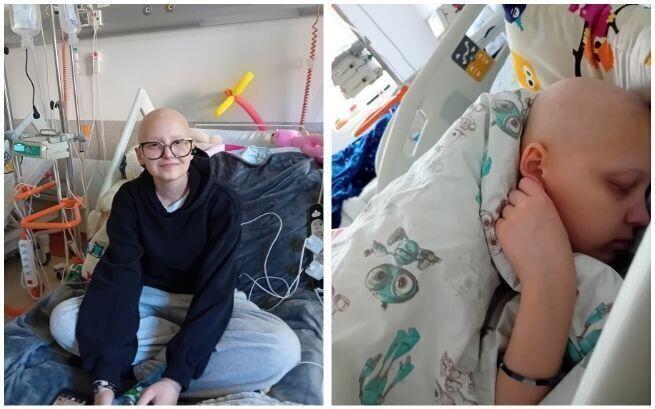1,027 Days of Courage – The Boy Who Taught the World How to Fight With Joy.2551
Bryson’s Light – A Mother’s Battle to Keep Living After Loss
“Everyone is afraid of dying, until you lose a child… then you’re afraid of living.”
Those words echo endlessly in Lilian McGrath’s heart. Words she never wanted to understand — until life forced her to.

Just days ago, she laid her 5-year-old son, Bryson, to rest. A child who spent 1,027 days fighting a battle most adults could never endure. A little boy whose laughter filled hospital corridors, whose courage inspired strangers, and whose joy, even in pain, reminded everyone that light can still shine in the darkest places.

Now that light feels unbearably distant.
Lilian sits in the quiet of her living room, Bryson’s favorite blanket draped over her knees. The toys he used to scatter across the floor remain untouched — frozen in time, like her heart. His shoes still by the door. His drawings still taped to the fridge. It’s as if the world around her has stopped, but cruelly, the clock keeps ticking.

She can still hear him. His tiny voice, his contagious giggle, the way he’d say, “Mommy, don’t be sad. I’m okay.” He said that a lot — especially in the hospital.\

Bryson was born full of life, wild and curious, with a grin that could melt even the hardest heart. He loved superheroes, chocolate milk, and dinosaurs. But more than anything, he loved people. Doctors, nurses, strangers passing in the hallway — everyone got a wave, a smile, sometimes even a sticker from his collection.

Then came the diagnosis. Three words that tore their world apart: neuroblastoma — stage four.
The first few days were a blur of disbelief and fear. Lilian remembers holding Bryson’s hand while doctors explained chemotherapy, ports, scans, surgeries — words that didn’t seem real for a child so small. She remembers crying silently in the hospital bathroom, forcing herself to be strong when she walked back into his room.

But Bryson? He didn’t let fear win. He faced each needle, each treatment, with a smile. When nurses came with the IV bags, he’d ask, “Is this my superhero medicine today?” And when the pain got bad, he’d close his eyes and whisper, “It’s okay, Mom. I’ll feel better tomorrow.”

That became their rhythm — fear and faith, pain and laughter, heartbreak and hope — woven together in the fragile fabric of their days.
Over those 1,027 days, Bryson fought with everything he had. He lost his hair but not his light. He lost his strength but not his joy. When he couldn’t run anymore, he’d race toy cars on his hospital tray. When he couldn’t go outside, he’d tell stories about all the adventures he’d have “when I get better.”

The nurses adored him. The doctors called him their “little sunshine.” Strangers who followed his journey online said his smile gave them strength to face their own storms.

And through it all, Lilian watched — in awe, in fear, in love that stretched beyond anything she thought her heart could hold.
Then came the day she knew she’d have to let him go.

It wasn’t sudden. It was quiet — the way evening shadows creep in before you notice the sun is gone. His breaths had grown slower, his little body too tired to keep fighting. She lay beside him, whispering stories about heaven, about how he’d be free — no more needles, no more pain.

She told him it was okay to rest. And in one last, fragile moment, Bryson opened his eyes, smiled softly, and said, “I love you, Mommy.”
Then he was gone.

The world didn’t stop. Cars still drove by. Birds still sang. But inside Lilian, everything shattered.
The days that followed blurred together — the arrangements, the condolences, the endless stream of people saying, “He’s in a better place.” She nodded politely, but inside, she screamed:

On Sunday, friends and family gathered for Bryson’s Celebration of Life. There were balloons, music, and stories — because that’s what he would have wanted. His pictures lined the room, showing a child who lived every moment with joy. Even the nurses came, tears streaming down their faces, saying, “He changed us. He made us better.”

Lilian stood before them all, her voice trembling but clear. “My son taught me that strength isn’t about never breaking — it’s about loving through the breaking. Bryson lived with joy, even when it hurt. I want to do the same.”

But now, when the house is quiet, when the world moves on, she faces a truth more painful than anything she’s ever known: how to live after.
Grief is strange. It comes in waves — sometimes soft, sometimes fierce. One moment she’s numb; the next, she’s gasping for air. Every morning, she wakes up and reaches for a little hand that’s no longer there. Every night, she whispers goodnight into the silence.

She’s learning that survival after loss isn’t about forgetting — it’s about finding ways to keep loving through the pain. It’s about breathing, even when it hurts.

Sometimes she visits his grave, sitting in the grass with a cup of chocolate milk — his favorite. She talks to him about her day, about the people who still message her saying how much Bryson’s story changed them. She watches the wind move through the trees and imagines him there — laughing, running, free.

Other days, she can’t get out of bed. She stares at the ceiling, asking God why. Why children? Why him? Why her? But slowly, she’s learning there may never be an answer that makes sense — only the quiet reminder that love still exists, even after death.

Because Bryson’s love hasn’t left her. It lives in every memory, every photo, every person he touched. It’s in the laughter of other children, in the sunrise that breaks through her tears, in the small whisper that tells her, “Keep going, Mommy.”

She doesn’t know what tomorrow will look like. But she knows she’ll try — for him.

Because that’s what Bryson would want: for her to live, not just survive. To smile again. To find joy again. To keep carrying his light into the world.

And maybe one day, when her time comes, she’ll see him again — running toward her with that same bright grin, shouting, “Mommy, I missed you!”

Until then, she’ll keep holding on to the love that death can’t take away.
Zuzia’s Fight Beyond Cancer – A Brave Girl’s Journey Through Fear and Hope.2193

Zuzia’s Fight Beyond Cancer – A Brave Girl’s Journey Through Fear and Hope
Dear friends,
It’s been a while since we last wrote about our brave little warrior, Zuzia. So many of you have followed her journey from the very beginning — the tears, the sleepless nights, the hospital corridors, the endless treatments. Today, we want to share where she is now, how she’s fighting, and how much strength she continues to find despite everything that cancer has taken away.
Zuzia is not just battling Hodgkin’s lymphoma, but also something far more invisible — loneliness and the lasting effects of chemotherapy.
When doctors told us that our daughter was finally in remission, we cried with relief. For months, that word felt like a dream — unreachable, almost unreal. But even as we celebrated, deep inside there was fear. Because remission does not mean the end. It means a fragile pause — a moment to breathe before life starts rebuilding itself again.
And rebuilding is hard.
Chemotherapy saved her life, but it also left her body weak and fragile. The powerful drugs that fought the cancer also damaged her strength. Zuzia’s muscles began to waste away; she could no longer walk properly. Every step became a challenge. Her balance was unstable. She would fall easily, her legs trembling under her own weight.
Our daughter, who once loved dancing around the living room, now had to learn to stand again.

We began intensive rehabilitation and massage therapy to help her regain her strength. Twice a week, she works with her physiotherapist, who focuses on stabilizing her movements and rebuilding muscle control. It’s exhausting work — for both her body and her spirit. There are days when she cries, frustrated that her body no longer listens to her. But there are also moments of victory — when she manages a few steps on her own, or stands without support, and her eyes light up with pride.
She supports her recovery both naturally and medically. We’ve adjusted her diet, added supplements, and continue her prescribed treatment plan to strengthen her immune system. Every small improvement feels like a triumph.
Still, the road is long.
The scars of cancer are not only physical. Zuzia struggles with isolation. Her friends from before the illness have moved on — school, games, carefree afternoons. She, however, spent months in hospital rooms and sterile corridors, connected to machines and surrounded by adults in masks. Sometimes she asks us quietly, “Mom, why do I feel so different?” And I have no answer, only tears I try to hide.

Even though the doctors say she’s in remission, our hearts are filled with mixed emotions. Joy — because she’s still with us, smiling, fighting. But also fear — because we know how fragile this victory can be. We’ve seen too many families like ours lose their children after remission. We’ve lit candles for friends who once shared hospital rooms with us, children who laughed with Zuzia during treatment — now only memories.
That’s why every day feels precious. Every morning when she wakes up and says “good morning” is a gift. Every laugh, every small step forward, every moment she spends outside the hospital walls — they’re miracles we don’t take for granted.

Zuzia has always been our sunshine — brave, gentle, and full of warmth. Even during the hardest days of chemotherapy, when she was weak and pale, she smiled to comfort us. “Don’t cry, Mommy,” she would whisper, “it’s going to be okay.”
She still keeps that strength today. But we, her parents, know that she needs more help to return to her old self. She needs continued rehabilitation, proper nutrition, medications, and psychological support. All of that comes at a cost far beyond what we can afford.
And that’s why we’re reaching out once again — not with despair, but with hope.
Your support has carried us through the darkest times. Thanks to your kindness, Zuzia made it through chemotherapy. Thanks to you, she’s still here. Every donation, every message, every kind word gave her the strength to keep fighting.
We’re forever grateful — but we must ask again: please, don’t stop helping our princess.
Zuzia still has a long road ahead before she can truly live like other children — run, play, dance, and go to school without fear. With your help, she can continue her recovery and regain her strength.
She’s beaten cancer once. Now she’s fighting for her life after cancer — to live fully, freely, and joyfully.
Please, stay with us on this journey. Help us give Zuzia the future she’s fought so hard for.
With gratitude and love,
Zuzia’s parents






